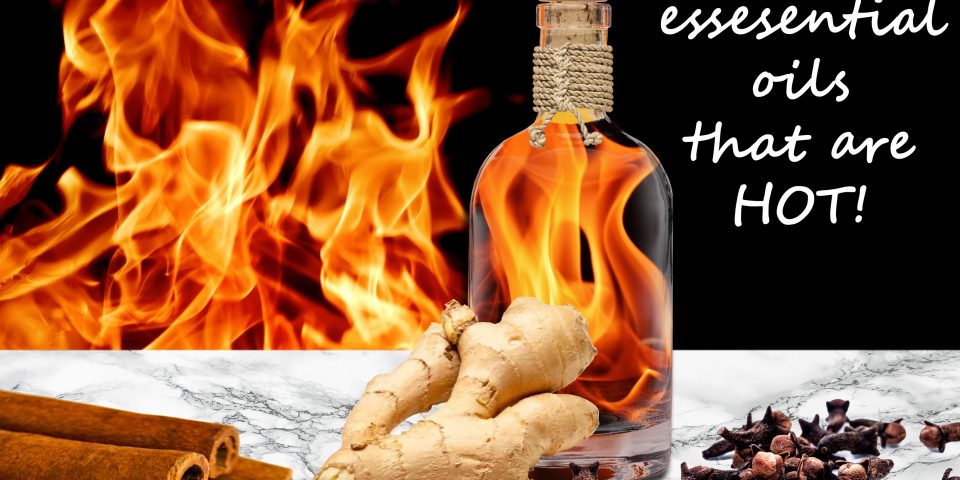Essentials Oils Considered to be “HOT”
The following list includes essential oils considered to be HOT and the therapeutic properties generally attributed to them. These statements have not been evaluated by the Food and Drug Administration. These oils are not intended to diagnose, treat, cure or prevent any disease. Always check with your healthcare professional before using these oils.
| CAUTION Spice essential oils and some of the more exotic spices like ginger or cardamom generally have very high dermotoxicity of all essential oils. Care should be exercised when using them. Do not touch your face when handling these oils. Keep away from the eyes and mucous membranes. Do not use these oils if you have sensitive skin as a burning sensation may occur. Always check with your healthcare professional before using these oils. Never use undiluted. DO NOT TAKE INTERNALLY. |
Essential Oil General Safety Information: Essential Oils (EOs) are highly concentrated extractions of plants and can be harmful if not used carefully. Incorporating EOs into your lifestyle should not cause unnecessary work, but it is important to heed all safety precautions. Never take EOs internally, even if a label say it is safe for consumption by mouth. Never put undiluted EOs directly onto your skin (NEAT) to avoid sensitization of skin, and never apply NEAT to broken skin. Some EOs can cause irritation, sensitization or allergic reactions in some individuals. When using a new oil topically for the first time, perform a skin patch test on a small area of the skin. Some EOs are phototoxic and can cause irritation, inflammation, blistering, redness and/or burning when exposed to UVA rays of the sun. Discontinue using EOs immediately if you encounter any irritation, redness or reaction. Take care when adding EOs directly to bathwater. EOs do not stayed mixed in water, and can, therefore “pool” causing the EO to touch body areas in full strength with the potential for irritation. Some EOs should be avoided during pregnancy or by those with asthma, epilepsy, or other health conditions. Avoid using EOs near the genitals, mouth, nose, eyes and ears. Extreme caution should be used with children and elderly (due to medication mix). Care should be taken when using EOs near animals as not all EOs are safe to use on dogs, cats, birds, horses or other pets. EOs are flammable; keep them away from fire hazards.
Essentials Oils Considered to be “HOT”
Hot oils (some of the spice essential oils) are a group of oils that are very high in antioxidants and feel “hot” when applied to skin. Generally, they are related to our digestion and overall well-being, but have many other uses. Hot oils can heat and stimulate the digestive track, enhancing digestive processes, help relieve constipation, and also stimulate the body’s circulatory and glandular systems, boosting metabolism. Hot oils can be soothing and relaxing to the area applied or can have a warming sensation and be stimulating. Hot oils have commonly been used for acute or seasonal pain, help to restore comfort to tired joints. Their antispasmodic property helps them to relieve tense muscles, menstrual cramps, stomach cramps, muscle pain, even headaches and migraines. The hot oils are very antiseptic and effective against parasites, bacteria and viruses.
List of Spice “Hot” Essential Oils
- Allspice Berry (Pimenta officinalis, Pimenta dioica) –anesthetic, analgesic, antiseptic, antioxidant, carminative, relaxant, rubefacient, helps maintain proper metabolism, Stimulant to blood, digestion and secretions; tonic
- Anise, star CHINESE (Illicum verum) contains anethole which has shown hypoglycemic, antioxidant, antimicrobial, hypolipidemic, and oestrogenic properties, sedative, analgesic-antinociceptive (inhibits nociception, the sensation of pain e.g., rheumatism, chest pain, muscular pains), antiseptic, antidepressant, anthelmintic-antiparasitic, antioxidant, antimicrobial, antifungal, insecticidal, secretolytic- expectorant, anti-inflammatory, gastroprotective-digestive issues (gas, flatulence, indigestion, stomachaches), and spasmolytic-antispasmodic esp. smooth tissue (coughs, cramps, diarrhea, aches, convulsions and nervous afflictions), estrogenic effects, and has warming effect on circulatory and respiratory systems.
- Black Pepper Fruit (Piper nigrum) analgesic, anticatarrhal, anti-inflammatory, antiseptic, antispasmodic, antitoxic, aphrodisiac, expectorant, laxative, rubefacient and stimulant (nervous, circulatory and digestives systems). This oil may increase cellular oxygenation, support digestive glands, stimulate endocrine system, increase energy, and help rheumatoid arthritis. It may also help with loss of appetite, catarrh, chills, cholera, colds, colic, constipation, coughs, diarrhea, dysentery, dyspepsia, dysuria, flatulence (combine with fennel), flu, heartburn, influenza, nausea, neuralgia, poor circulation, poor muscle tone, quinsy, sprains, toothache, vertigo, viruses, and vomiting.
- Cardamon (Elettaria cardamomum) Anti-bacterial, anti-infectious, antiseptic, antispasmodic, aphrodisiac, digestive, diuretic, stomachic, and tonic. Insecurity, loss of self-confidence, emotional inhibition, discouragement, pessimism, moodiness, fatigue, loss of mental focus, chronic anxiety and depression, insomnia, nervous breakdown, hot spells, chills, appetite loss, chronic indigestion, abdominal bloating and pain, flatulence, nausea, vomiting, alternating constipation and diarrhea, heartburn, chronic productive cough. A member of the ginger family, cardamom, is warming, sensual and intoxicating, aphrodisiac blend. Natural diuretic, digestive stimulant, antiseptic, spicy, balsamic, floral tones, woody tones, slightly camphorous, calms the mind and promotes emotional balance, can help reduce drowsiness and improve concentration. Cardamom has grounding properties, can assist with stress, fatigue, help ease and upset stomach and calm nausea. Can be used as a mouthwash, and can help combat bath breath and assist with bleeding gums because of its antiseptic properties. In a massage oil, it can help to boost circulation.
- Cinnamon Cassia (Cinnamomum cassia), anti-bacterial, anti-fungal, anti-viral, antigalactogogue, antimicrobial, astringent, circulatory, emmenagogue, febrifuge, stimulant. May promote digestion and immune function. This oil has a strong and uplifting scent. Cassia has been used for colic, nausea, digestive complaints on other ailments.
- Cinnamon Bark (Cinnamomum zeylanicum), can be likened to a sharp hot kick. It is a spicy, warming oil that is energizing and stimulating with antiseptic properties. It has a very potent and quite wonderful aromatic fragrance. You can feel “warmed up” by simply smelling it. Cinnamon bark helps to energize the mind and helps to inspire creativity and lifts spirits. Cinnamon bark may help with exhaustion and depression, as well as helping stimulate appetite. It may help lower insulin resistance and help blood sugar levels. (https://www.webmd.com/diabetes/cinnamon-and-benefits-for-diabetes)
- Cumin (Cuminum cyminum), Anti-bacterial, antioxidant, anti-parasitic, antiseptic, antispasmodic, antitoxic, anti-viral, aphrodisiac, digestive, stimulant (heart, immune and nervous systems), and tonic. During biblical times it was used by the Hebrews as an antiseptic during their ceremony of circumcision. Used as a main ingredient in curry, it wis also used to help with flatulence, the digestive system, for rheumatic conditions, the heart, and the nervous system.
- Clove Bud (Syzgium aromaticum), Analgesic, anti-bacterial, anti-fungal, anti-infectious, anti-inflammatory, anti-parasitic, strong antiseptic, anti-tumoral, anti-viral, disinfectant, and an immune-stimulant. Due to its antiseptic quality use to help cleanse teeth and gums; clove helps fight germs that cause bad breath. Clove’s analgesic and antiseptic properties are useful in mouth and for oral infections. Frequently used in dentistry applications to ease tooth pain and swelling. Use for digestive upsets to relieve nausea and colic. Its anti-inflammatory properties may help with arthritis, rheumatism, sprains, circulation, and to soothe muscles and joints. In the respiratory system, clove may help ease asthma, bronchitis, coughs, sinusitis
- Ginger Root (Zingiber officinalis) hot, earthy notes to any blend and can help support healthy digestion. Do not take internally, do not touch your face, neck or eyes. Always dilute in a base at 0.5% with a carrier oil. A restorative tonic that is anti-inflammatory and analgesic, relieves migraines and headaches. For digestive problems (from overeating or stress) apply in highly diluted blend and spread on abdomen or use with a compress, stimulant, helps with tension headaches, muscle soreness when applied locally, boosts circulation, helpful for travel sickness and nausea and useful for nausea when pregnant. As an inhalant, ginger can help with congestion and heaviness in the lungs, or soothe pain when a cold has already been acquired. clears stagnant energy in the system and beneficial for the heart. helping lift feelings of mental fatigue or confusion), can be slightly phototoxic.
- Nutmeg Seed (Myristica fragrans), anti-inflammatory, antiparasitic, antiseptic, stimulant (cerebral/circulatory), laxative, tonic. for use with digestive, flatulence (gas), nausea, vomiting, chronic diarrhea, loss of appetite, helps digest starchy foods and fats, gallstones, and kidney problems. Can help with bacterial infection, halitosis (bad breath), rheumatism, arthritis. Nutmeg may help sooth menstrual pain, joints and muscles (also muscle aches and pains), nervous fatigue, neuralgia (severe pain along nerve), support nervous and circulatory systems. This oil has adrenal cortex-like activity, which may help support the adrenal glands for increased energy, and support the immune function.
Never make LINIMENTS using HOT oils.
REFERENCES:
- Aromatica: A Clinical Guide to Essential Oil Therapeutics (Vol. 1 & 2) by Peter Holmes LAc, MH
- Reference Guide for Essential Oils by Connie and Alan Higley
- The Encyclopedia of Essential Oils by Julia Lawless
- Web MD (https://www.webmd.com/diabetes/cinnamon-and-benefits-for-diabetes)
Grace to you and peace from God our Father and the Lord Jesus Christ. Philippians 1:2
Til next time,




